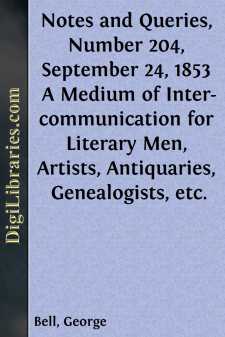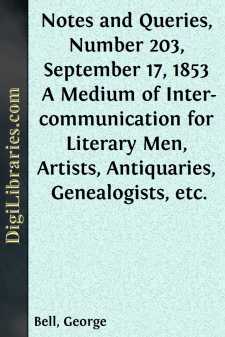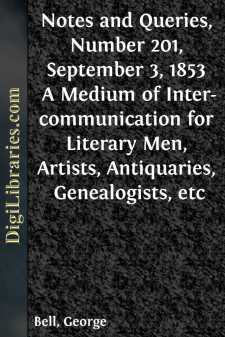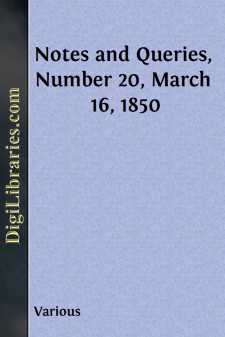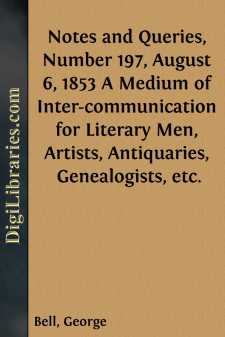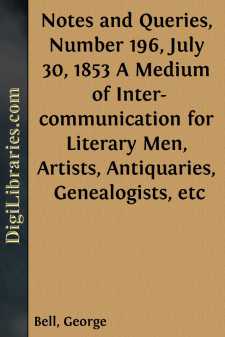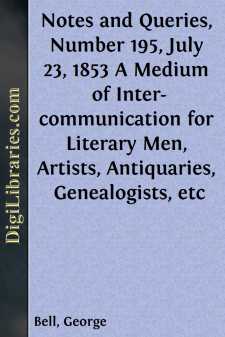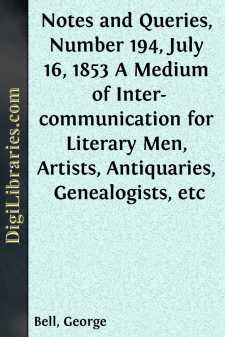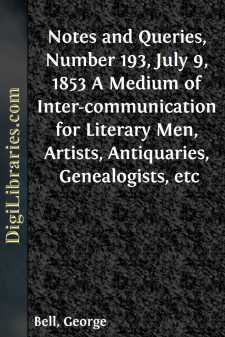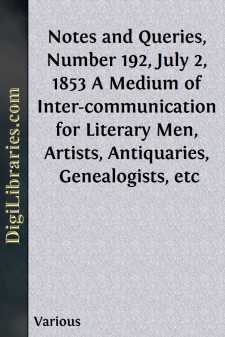Periodicals
- Art 27
- Children's periodicals 59
- Entertainment 5
- Food/Wine 2
- Games/Humor 455
- General
- Health 1
- History 53
- House/Home 1
- Regional 62
- Science/Nature 118
- Transportation 10
General Books
Sort by:
by:
George Bell
EXTINCT VOLCANOS AND MOUNTAINS OF GOLD IN SCOTLAND. It is by some supposed that the Hill of Noth, in the parish of Rhynie, Aberdeenshire, had at one time been a volcano in full operation: others, again, maintain that the scoria found on and in the neighbourhood are portions of a vitrified fort, which had at one time stood on its summit. I am not aware that the matter has been investigated since our...
more...
by:
George Bell
OUR SHAKSPEARIAN CORRESPONDENCE. We have received from a valued and kind correspondent (not one of those emphatically good-natured friends so wittily described by Sheridan) the following temperate remonstrance against the tone which has distinguished several of our recent articles on Shakspeare:— Shakspeare Suggestions (Vol. viii., pp. 124. 169.).— "Most busy, when least I do." I am...
more...
by:
George Bell
"THAT SWINNEY." Junius thus wrote to H. S. Woodfall in a private note, to which Dr. Good has affixed the date July 21st, 1769 (vol. i. p. 174.*) "That Swinney is a wretched but dangerous fool. He had the impudence to go to Lord G. Sackville, whom he had never spoken to, and to ask him whether or no he was the author of Junius: take care of him." This paragraph has given rise to a great...
more...
by:
Various
NOTES. KING ALFRED'S GEOGRAPHY OF EUROPE. There is no other printed copy of the A.-S. Orosius than the very imperfect edition of Daines Barrington, which is perhaps the most striking example of incompetent editorship which could be adduced. The text was printed from a transcript of a transcript, without much pains bestowed on collation, as he tells us himself. How much it is to be lamented that...
more...
by:
George Bell
HIGH CHURCH AND LOW CHURCH. A Universal History of Party; with the Origin of Party Names would form an acceptable addition to literary history: "N. & Q." has contributed towards such a work some disquisitions on our party namesWhigandTory, andThe Good Old Cause. Such names asPuritan,Malignant,Evangelical, can be traced up to their first commencement, but some obscurity hangs on the...
more...
by:
George Bell
BOOKS CHAINED TO DESKS IN CHURCHES: FONT INSCRIPTION: PAROCHIAL LIBRARIES. It would be interesting to have a complete list of the various books still to be found chained to desks in our ancient churches. The "Bible of the largest volume," the "Books of Homilies allowed by authority," and the Book of Common Prayer, are ordered by Canon 80. to be provided for every church. In some places...
more...
by:
George Bell
WILLIAM BLAKE. My antiquarian tendencies bring me acquainted with many neglected and obscure individuals connected with our earlier English literature, who, after "fretting their hour" upon life's stage, have passed away; leaving their names entombed upon the title-page of some unappreciated or crotchetty book, only to be found upon the shelves of the curious. To look for these in Kippis,...
more...
by:
George Bell
DERIVATION OF THE WORD "ISLAND." Lexicographers from time to time have handed down to us, and proposed for our choice, two derivations of our English word Island; and, that one of these two is correct, has, I believe, never yet been called in question. The first which they offer, and that most usually accepted as the true one, is the A.-S. Ealand, Ealond, Igland; Belg. Eylandt: the first...
more...
by:
George Bell
THE EYE: ITS PRIMARY IDEA. I do not remember to have remarked that any writer notices how uniformly, in almost all languages, the same primary idea has been attached to the eye. This universal consent is the more remarkable, inasmuch as the connexion in question, though of course most appropriate and significant in itself, hardly seems to indicate the most prominent characteristic, or what we should...
more...
by:
Various
OBLATION OF A WHITE BULL. By lease dated 28th April, 1533, the Abbat of St. Edmund's Bury demised to John Wright, glazier, and John Anable, pewterer, of Bury, the manor of Haberdon appurtenant to the office of Sacrist in that monastery, with four acres in the Vynefeld, for twenty years, at the rent of 5l. 4s. to the Sacrist; the tenants also to find a white bull every year of their term, as often...
more...


